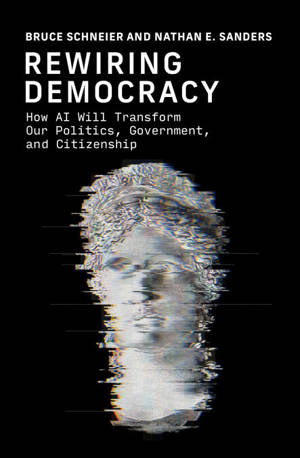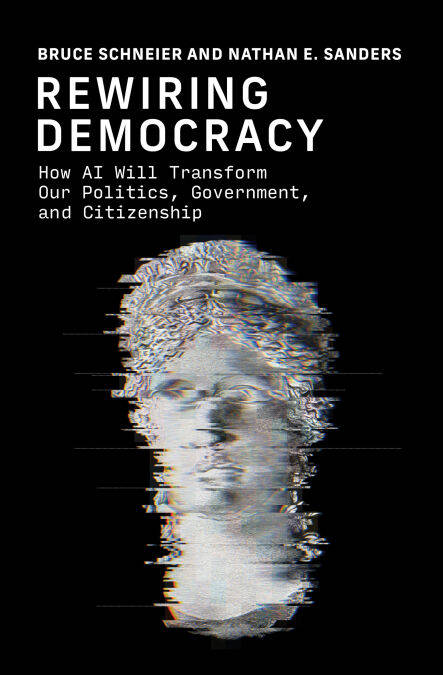
Bedankt voor het vertrouwen het afgelopen jaar! Om jou te bedanken bieden we GRATIS verzending (in België) aan op alles gedurende de hele maand januari.
- Afhalen na 1 uur in een winkel met voorraad
- In januari gratis thuislevering in België
- Ruim aanbod met 7 miljoen producten
Bedankt voor het vertrouwen het afgelopen jaar! Om jou te bedanken bieden we GRATIS verzending (in België) aan op alles gedurende de hele maand januari.
- Afhalen na 1 uur in een winkel met voorraad
- In januari gratis thuislevering in België
- Ruim aanbod met 7 miljoen producten
Zoeken
Rewiring Democracy E-BOOK
How AI Will Transform Our Politics, Government, and Citizenship
Bruce Schneier, Nathan E. Sanders
€ 29,52
+ 29 punten
Uitvoering
Omschrijving
From the New York Times–bestselling author of The Hacker's Mind and Data & Goliath, an informative and wide-ranging exploration of how AI will alter every facet of democracy, and how to harness the technology to distribute rather than concentrate power.
AI is changing democracy. We still get to decide how.
AI’s impact on democracy will go far beyond headline-grabbing political deepfakes and automated misinformation. Everywhere it will be used, it will create risks and opportunities to shake up long-standing power structures.
In this highly readable and advisedly optimistic book, Rewiring Democracy, security technologist Bruce Schneier and data scientist Nathan Sanders cut through the AI hype and examine the myriad ways that AI is transforming every aspect of democracy—for both good and ill.
The authors describe how the sophistication of AI will fulfill demands from lawmakers for more complex legislation, reducing deference to the executive branch and altering the balance of power between lawmakers and administrators. They show how the scale and scope of AI is enhancing civil servants’ ability to shape private-sector behavior, automating either the enforcement or neglect of industry regulations. They also explain how both lawyers and judges will leverage the speed of AI, upending how we think about law enforcement, litigation, and dispute resolution.
Whether these outcomes enhance or degrade democracy depends on how we shape the development and use of AI technologies. Powerful players in private industry and public life are already using AI to increase their influence, and AIs built by corporations don’t deliver the fairness and trust required by democratic governance. But, steered in the right direction, AI’s broad capabilities can augment democratic processes and help citizens build consensus, express their voice, and shake up long-standing power structures.
Democracy is facing new challenges worldwide, and AI has become a part of that. It can inform, empower, and engage citizens. It can also disinform, disempower, and disengage them. The choice is up to us. Schneier and Sanders blaze the path forward, showing us how we can use AI to make democracy stronger and more participatory.
AI is changing democracy. We still get to decide how.
AI’s impact on democracy will go far beyond headline-grabbing political deepfakes and automated misinformation. Everywhere it will be used, it will create risks and opportunities to shake up long-standing power structures.
In this highly readable and advisedly optimistic book, Rewiring Democracy, security technologist Bruce Schneier and data scientist Nathan Sanders cut through the AI hype and examine the myriad ways that AI is transforming every aspect of democracy—for both good and ill.
The authors describe how the sophistication of AI will fulfill demands from lawmakers for more complex legislation, reducing deference to the executive branch and altering the balance of power between lawmakers and administrators. They show how the scale and scope of AI is enhancing civil servants’ ability to shape private-sector behavior, automating either the enforcement or neglect of industry regulations. They also explain how both lawyers and judges will leverage the speed of AI, upending how we think about law enforcement, litigation, and dispute resolution.
Whether these outcomes enhance or degrade democracy depends on how we shape the development and use of AI technologies. Powerful players in private industry and public life are already using AI to increase their influence, and AIs built by corporations don’t deliver the fairness and trust required by democratic governance. But, steered in the right direction, AI’s broad capabilities can augment democratic processes and help citizens build consensus, express their voice, and shake up long-standing power structures.
Democracy is facing new challenges worldwide, and AI has become a part of that. It can inform, empower, and engage citizens. It can also disinform, disempower, and disengage them. The choice is up to us. Schneier and Sanders blaze the path forward, showing us how we can use AI to make democracy stronger and more participatory.
Specificaties
Betrokkenen
- Auteur(s):
- Uitgeverij:
Inhoud
- Aantal bladzijden:
- 360
- Taal:
- Engels
- Reeks:
Eigenschappen
- Productcode (EAN):
- 9780262384407
- Verschijningsdatum:
- 20/10/2025
- Uitvoering:
- E-book
- Beveiligd met:
- Adobe DRM
- Formaat:
- ePub

Alleen bij Standaard Boekhandel
+ 29 punten op je klantenkaart van Standaard Boekhandel
Beoordelingen
We publiceren alleen reviews die voldoen aan de voorwaarden voor reviews. Bekijk onze voorwaarden voor reviews.









